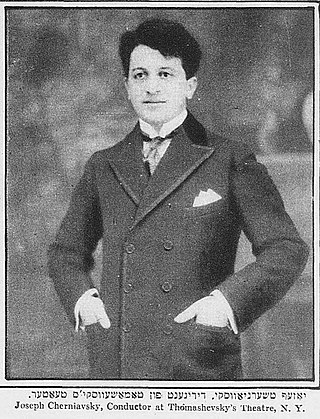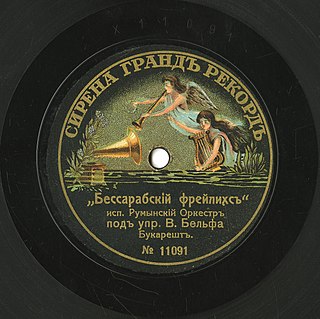
Klezmer is an instrumental musical tradition of the Ashkenazi Jews of Central and Eastern Europe. The essential elements of the tradition include dance tunes, ritual melodies, and virtuosic improvisations played for listening; these would have been played at weddings and other social functions. The musical genre incorporated elements of many other musical genres including Ottoman music, Baroque music, German and Slavic folk dances, and religious Jewish music. As the music arrived in the United States, it lost some of its traditional ritual elements and adopted elements of American big band and popular music. Among the European-born klezmers who popularized the genre in the United States in the 1910s and 1920s were Dave Tarras and Naftule Brandwein; they were followed by American-born musicians such as Max Epstein, Sid Beckerman and Ray Musiker.

Naftule Brandwein, or Naftuli Brandwine, was an Austrian-born Jewish American Klezmer musician, clarinetist, bandleader and recording artist active from the 1910s to the 1940s. Along with Dave Tarras, he is considered to be among the top klezmer musicians of the twentieth century, and has a continuing influence on musicians in the genre a century later. Along with Tarras and other contemporaries like Israel J. Hochman, Max Leibowitz and Harry Kandel, he also helped forge the new American klezmer sound of the early twentieth century, which gradually gravitated towards a sophisticated big-band sound.

Harry Kandel was an American clarinetist and klezmer bandleader of the early twentieth century. His recording career with the Victor Recording Company lasted from 1916 to 1927, during which he released dozens of Jewish music records.

Joseph Moskowitz was an American cimbalom player, composer, restaurant owner and recording artist in New York City during the first half of the twentieth century. A descendant of a family of klezmer musicians, he was among the most well-known American cimbalom players of his time, and had a wide repertoire which included not only Jewish music but also Romanian, classical, and ragtime music. He is thought to have composed over 100 cimbalom pieces which drew upon various musical influences. His restaurant Moskowitz & Lupowitz, on Second Avenue also became a popular destination and celebrity hangout in the 1920s and 1930s.

Abe Schwartz was an American klezmer violinist, composer, Yiddish theater and ethnic recordings bandleader from the 1910s to the 1940s. In his various orchestras, he recorded many of the leading klezmer musicians of the early twentieth century, including Naftule Brandwein and Dave Tarras.
Dave Tarras was a Ukrainian-born American klezmer clarinetist and bandleader, who was instrumental in the Klezmer revival.

Joel Rubin is an American clarinetist, klezmer musician, ethnomusicologist, and scholar of Jewish music. Since becoming involved in the klezmer revival in the late 1970s, he has been researching, teaching and performing klezmer music and related genres. He has been a member of, or performed with, such groups as Brave Old World, the Joel Rubin Ensemble, and Veretski Pass.
Shloimke Beckerman also known as Samuel Beckerman, was a klezmer clarinetist and bandleader in New York City in the early twentieth century; he was a contemporary of Dave Tarras and Naftule Brandwein. He was the father of Sid Beckerman, also a klezmer bandleader.

Hypnotic Clambake is a musical group from Rochester, New York known for exploring a wide variety of musical genres. Founded by frontman and accordionist Maury Rosenberg in 1989, in Boston, Massachusetts, the group began as a studio recording project and later evolved into a touring band. Rosenberg graduated from the Berklee College of Music, where he majored in filmscoring.

Mayonnaise is the name of Hypnotic Clambake's fifth full-length studio album. It was released in 2005 on Blue Button Records. The album showcases the musical talents of the band's lineup at the time. It also employs catchy, pop-format songs to explore a range of humorous topics. Typical of Hypnotic Clambake, the record wanders through a wide variety of musical genres, "from Middle Eastern spice to chill calypso style." Bandleader Maury Rosenberg collaborated heavily with guitarist/bassist Chris Reynolds on the record. Reynolds wrote several of the songs, including "500 Robots" and "Woe Is Me."
The Outrageous Universe Revival Festival is an annual summer camping festival which has been hosted by musical group Hypnotic Clambake since 1996. The three-day event features a wide array of musical and other performing artists, including several often-recurring acts, such as Pacific Northwest-based Singer-songwriter Baby Gramps. Creator of the event and Hypnotic Clambake frontman, Maury Rosenberg has touted the OUR Fest's "intimate" nature and explained that the natural beauty of the venue is a major factor contributing to the success of the weekend. The OUR Fest is held at the Kevin Cole Farm in the town of Panama, New York.

Joseph Cherniavsky was a Jewish American cellist, theatre and film composer, orchestra director, and recording artist. He wrote for the Yiddish theatre, made some of the earliest novelty recordings mixing American popular music, Jazz and klezmer in the mid-1920s, was also musical director at Universal Studios in 1928-1929, and had a long career in radio and musical theatre.

Itzikl Kramtweiss or Krantweiss, also known by the anglicized name Isadore Krantweiss, was a Russian-born American klezmer musician and recording artist of the early twentieth century. He was leader of the Broder Kapelle, a popular klezmer orchestra in Philadelphia which made recordings for the Victor Recording Company in the late 1920s.

Pedotser, also pronounced Pedutser in some Yiddish dialects, was the popular name of Aron-Moyshe Kholodenko, a nineteenth century Klezmer violin virtuoso, composer and bandleader from Berdychiv, Russian Empire. He was one of a number of virtuosic klezmers of the nineteenth century, alongside Yosef Drucker "Stempenyu", Yehiel Goyzman "Alter Chudnover" and Josef Gusikov.
Abraham Katzman was an American Klezmer violinist, bandleader, composer, and Brunswick Records recording artist of the 1920s. He was the father of film producer Sam Katzman, uncle of American arranger and bandleader Louis Katzman and the great-uncle of Henry Katzman and Leonard Katzman.

Abraham "Art" Shryer was a Russian-born American Klezmer cornetist, bandleader, and recording artist who was active in the New York City area in the 1920s and 1930s. In the late 1920s he recorded a number of Jewish and other Eastern European music sides for Brunswick Records, Vocalion Records, and Victor Records.

Alter Chudnover, whose real name was Yehiel Goyzman or Hausman, was a nineteenth century Klezmer violinist from the Russian Empire. He was one of a number of virtuosic klezmers of the nineteenth century, alongside Yosef Drucker "Stempenyu", A. M. Kholodenko "Pedotser" and Josef Gusikov. He was also an early teacher to the violinist Mischa Elman.

Stempenyu was the popular name of Iosif Druker, a klezmer violin virtuoso, bandleader and composer from Berdychiv, Russian Empire. He was one of a handful of celebrity nineteenth century Jewish folk violinists from Ukraine; others included Aron-Moyshe Kholodenko "Pedotser" and Yechiel Goyzman "Alter Chudnover" from Chudniv. Sholem Aleichem loosely based his 1888 novel Stempenyu: A Jewish Novel on the real-life Stempenyu; it was adapted into various stage and film versions in the twentieth century.

Belf's Romanian Orchestra was a Jewish music recording ensemble from the Russian Empire. Although little is known about them, their numerous recordings for Syrena Rekord during the period of 1911 to 1914 are among the earliest documented examples of recorded klezmer music and are played in a style very different from the better-known American klezmer recordings of the 1910s and 1920s.
Michael Winograd is an American klezmer clarinetist and composer. He has performed with such groups and artists as Vulfpeck, Tarras Band, Geoff Berner, Socalled, Adrienne Cooper, Daniel Kahn & the Painted Bird and Michael Winograd and the Honorable Mentshn.















